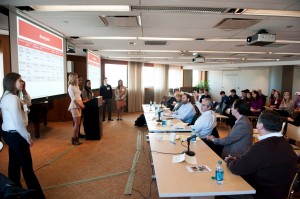 The idea of “impact investing” is gaining a great deal of attention these days, including in undergraduate education. While many institutions have offered classes in strategic philanthropy in recent years, and of course in traditional business investing for many, we have focused our efforts at SEI on developing educational programs for a new third way of investing. This new investment discipline involves socially minded investors providing capital to both for profit and non-profit enterprises that are committed to efficiently addressing social problems in both a sustainable and innovative way.
The idea of “impact investing” is gaining a great deal of attention these days, including in undergraduate education. While many institutions have offered classes in strategic philanthropy in recent years, and of course in traditional business investing for many, we have focused our efforts at SEI on developing educational programs for a new third way of investing. This new investment discipline involves socially minded investors providing capital to both for profit and non-profit enterprises that are committed to efficiently addressing social problems in both a sustainable and innovative way.
This Fall, we offered for a second time a course for freshman in which they were responsible for investing $10,000 in a “high impact” social enterprise. The seminar is a collaboration between our NU Honors Program and the D’Amore-McKim School of Business, in memory of the late Dean Tom Moore. The criteria used by students for evaluating investment opportunities included the use of impact measurement and evaluation tools that demonstrate that a non-profit, for profit or hybrid enterprise is having a sustainable and meaningful impact on addressing extreme poverty. Further, students developed analytical tools to evaluate the efficiency of these enterprises, creating a measure of “cost per life impacted” to comparatively evaluate the efficiency of achieved impact of a number of high impact social enterprises. Finally, the students focused on selecting entrepreneurial organizations committed to sustainable enterprise growth without comprising their social mission.
Students of impact investing learn that donations, or giving, to large, established charities will always be important, but that there are complementary approaches to addressing global problems like poverty. “Investing” in a social business (an enterprise with a social impact mission that uses profit to sustain the mission) can include a grant, a loan or an equity investment, depending on the circumstances and the need. Similarly, investing in a non-profit social enterprise can include a grant or a loan. Impact investing allows the socially minded investors more options for providing financial support to deserving organizations, and most notably allows a “blending” of both social and financial returns for those who value capital recovery for reinvestment in new opportunities.
Last year’s winner was the One Acre Fund (OAF), a nonprofit organization that is rethinking the chronic hunger problem in Africa by providing permanent, proven investment package for impoverished farmers and their families. OAF’s groundbreaking work in transforming the lives of small holder farmers in East Africa was recently featured in Roger Thurow‘s new book, “The Last Hunger Season: A Year in an African Farm Community on the Brink of Change.”
This year, our students selected for impact grants Microfinance Limited of Jamaica, a private for-profit microfinance institution providing loans and other services to the very poor at affordable prices in an around Kingston, and Manna Project International, a non-profit with operations in la Chureca, Nicaragua’s largest trash dump. MPI is working with women and families living in garbage to create a cooperative to sell artisan products to retailers like Walmart. Both organizations are small but rapidly growing entrepreneurial ventures with a commitment to improving the lives of very poor families, using innovative approaches to problem solving on behalf of very poor families seeking an opportunity to improve their lives. The original investment capital of $10,000 for the program was matched by other impact investors to provide a total of $30,000 to be shared by these two worthy organizations, evidencing the growing interest among socially minded investors. We are planning hands-on student field experiences with these organizations as part of our curriculum.
In a second undergraduate class in social enterprise, our students evaluated numerous social enterprises using an analytical framework developed by SEI. The evaluation criteria include motivation of the founder, business model, social innovation, financial sustainability, impact measurement and evaluation, and replication and scalability. A student fundraising initiative raised $2,500 to grant to an especially high performance social enterprise using this analytical tool, which was matched several times by donors to reach a total of $15,000. The grant will create three new library rooms and scholarships for poor children in India and elsewhere in the developing world through Room to Read, a highly entrepreneurial non-profit founded by a former Microsoft employee (John Wood). The creation of these new library rooms was done in honor of the late Naman Shah, a student of SEI who tragically passed away earlier this Fall.
Impact investing is clearly a powerful new force for good. It allows people to use their money to support enterprises that exemplify in their work the qualities we admire most in people, like kindness, compassion and generosity. We plan to grow our educational programs and field initiatives in the area in order to train a new generation of compassionate impact investors.


